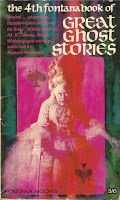In The Third Fontana Book of Great Ghost Stories (Fontana/Collins, 1966) Robert Aickman wrote:
Having mentioned three of the six (possible) masterpieces in the ghost story genre, Aickman tantalisingly refuses to tell us which are the other stories. It seems reasonable that they are not to be found elsewhere in the first three volumes of the Fontana books he edited (otherwise he would have mentioned them.) This rules out stories that connoisseurs of the genre might have thought strong candidates, including Walter de la Mare’s ‘Seaton’s Aunt’ and Edith Wharton’s ‘Afterward’.
It is not unreasonable to assume that the three remaining stories are to be found somewhere in Aickman's five subsequent Fontana volumes, although we must allow for the possibility that Aickman was unable to obtain copyright permission for them.
Another clue is Robert Aickman’s own library, which was catalogued after his death when it was sent to Bowling Green University. A large number of ghost story writers we know he read are not to be found among these books, so it is very possible that in his later years, having downsized from his large flat at the Barbican to smaller rooms at Gledhow Gardens, Aickman ‘pruned’ his collection. There is a strong possibility, I would argue, that he would have retained those three remaining ‘masterpieces’ on his shelves. I suggest that it is in the over-lap between the Fontana collections and his library that we will find the remaining three stories….
 Possibilities from the 4th Fontana volume are:
Possibilities from the 4th Fontana volume are:
All of the above stories were in collections that Aickman retained. Of course, it is possible that he didn’t need to keep a copy of all the ‘masterpieces’ in their original publications, as they were in his own copies of the Fontana volumes.
The only story other than the initial three which Aickman called a masterpiece (actually, an ‘unqualifiable masterpiece’) is Turgenev’s ‘Bezhin Lea’. It is, perhaps, the most likely addition to the list which would now comprise:
That the remaining two are to be found in the other stories mentioned in this blog is likely, but who can say which they are…













Is it possible that Aickman believed that he was the author of the three unnamed masterpieces in the ghost-story genre?
ReplyDeleteIt would be interesting to know whether he knew of the ghost stories of Lafcadio Hearn or F. Marion Crawford, and what he thought of them.
It is possible! But Aickman was a genuine fan of the genre and knew which were the gems amongst the also-rans. He will have known Lafcadio Hearn and F. Marion Crawford, I am sure, even though he didn't include them in his eight Fontana anthologies.
ReplyDeleteI admire the deductive logic, but the conclusion---i.e., the list of the various stories likely to be the missing three--isn't immediately persuasive. I don't think any connoisseur of the genre would even think of most of them as possibilitiies, certainly not in comparison to "Seaton's Aunt" and "Afterward," which you rightly mention, or three of my own longtime favorites, Vernon Lee's "Amour Dure," Margaret Oliphant's "The Library Window" and E.F.Benson's "The Room in the Tower." And nothing by M.R. James? Or Marjorie Bowen? --md
ReplyDeleteHi Michael. I am not convinced that my logic succeeds either, but his anthologies and his library were the only hard evidence I had that might give us an indication. It doesn't appear that Aickman was a huge admirer of M.R. James, and despite the best efforts of Des Lewis, we can't find that he made any reference to Bowen (apart from socialising with her once.) Lee, Oliphant and Benson must still all be contenders... In the end, the mystery remains!
DeleteA fascinating discussion!
ReplyDeleteRobert Aickman: An Attempted Biography mentioned Aickman's decision not to print more than one story by any author in the Fontana books that he edited. But is it known on what basis he chose stories? That is, did he select the story that he deemed best by any given author (from among those stories for which he could obtain permission)? Or did he sometimes choose stories for other reasons? (Or can we ever know?)
In the fourth Fontana book he included M. R. James's "A School Story," whereas some might consider "The Mezzotint," "Count Magnus," or "Oh Whistle, and I'll Come to You, My Lad" finer achievements. In the third book he included E. F. Benson's "Negotium Perambulans" (a delicious tale of a slug-like creature that sucks the life out of the blasphemous who dare to drink themselves into a nightly stupor in a house constructed of materials from a fallen church) instead of "The Room in the Tower." He did include Oliphant's "The Library Window" in the fifth book, but would he have considered Lee's "Oke of Okehurst" (in the sixth book) a finer story than "Amour Dure"? Did he think Bowen's "The Crown Derby Plate" (in the first book) the best of her stories?
It would be interesting to know how he chose the stories that he chose!
This comment has been removed by a blog administrator.
ReplyDeleteThere's another potential contender not mentioned yet, at least according to T.E.D Klein.
ReplyDeleteThe Fall 2019 edition of VASTARIEN (Vol 2; Issue 3) contains an interview with Klein (also contained in the 2021 reprint by Pickman's Press of the Klein short story collection, REASSURING TALES) in which (inter alia) Klein reflects on the one time he met Aickman.
Klein describes Aickman as having spoken at length to him about his admiration for Joseph Payne Brennan's "Levitation" (in the seventh Fontana collection), although he does provide the caveat that this may not necessarily mean that he rated it as one of the six best!